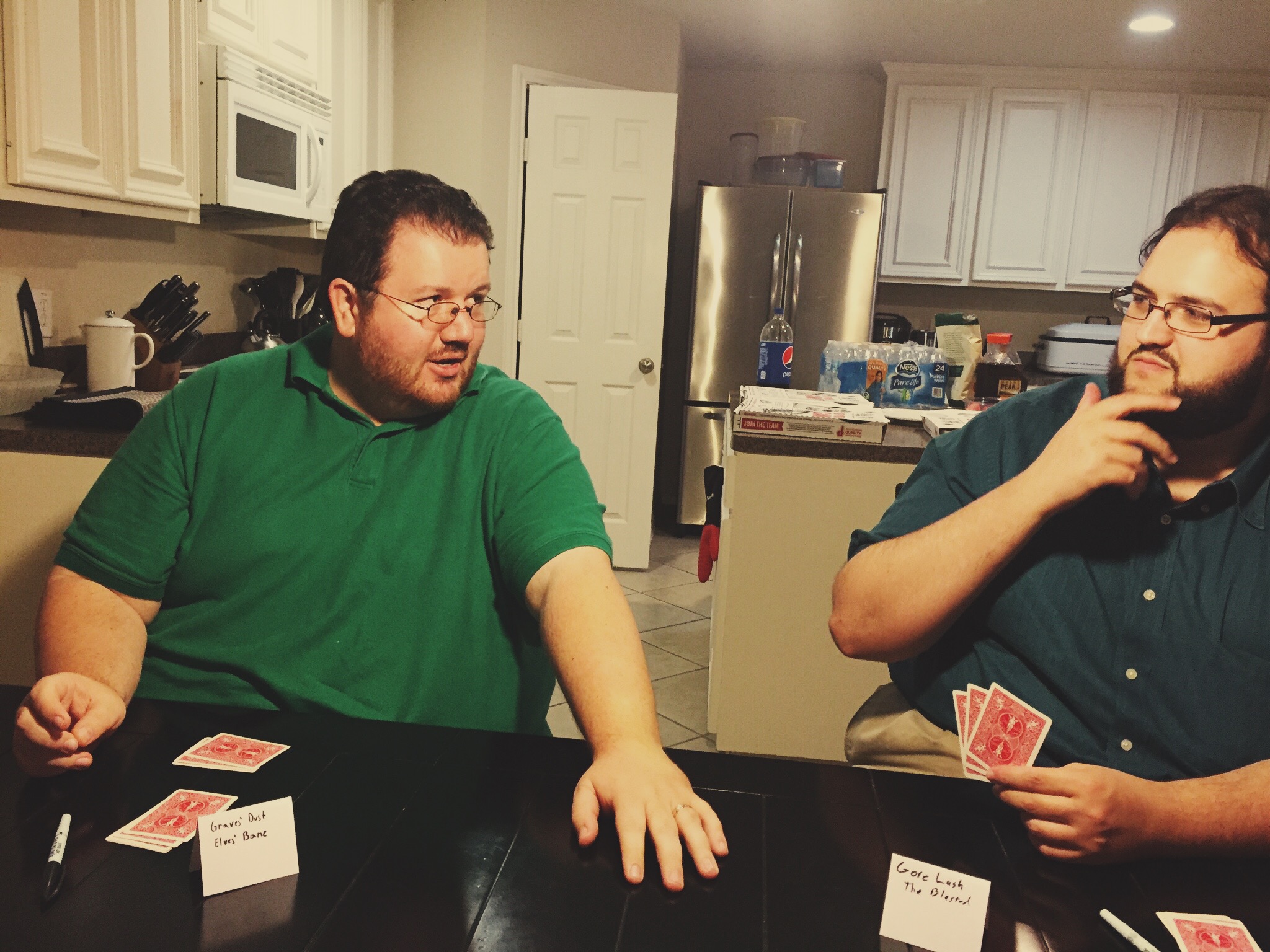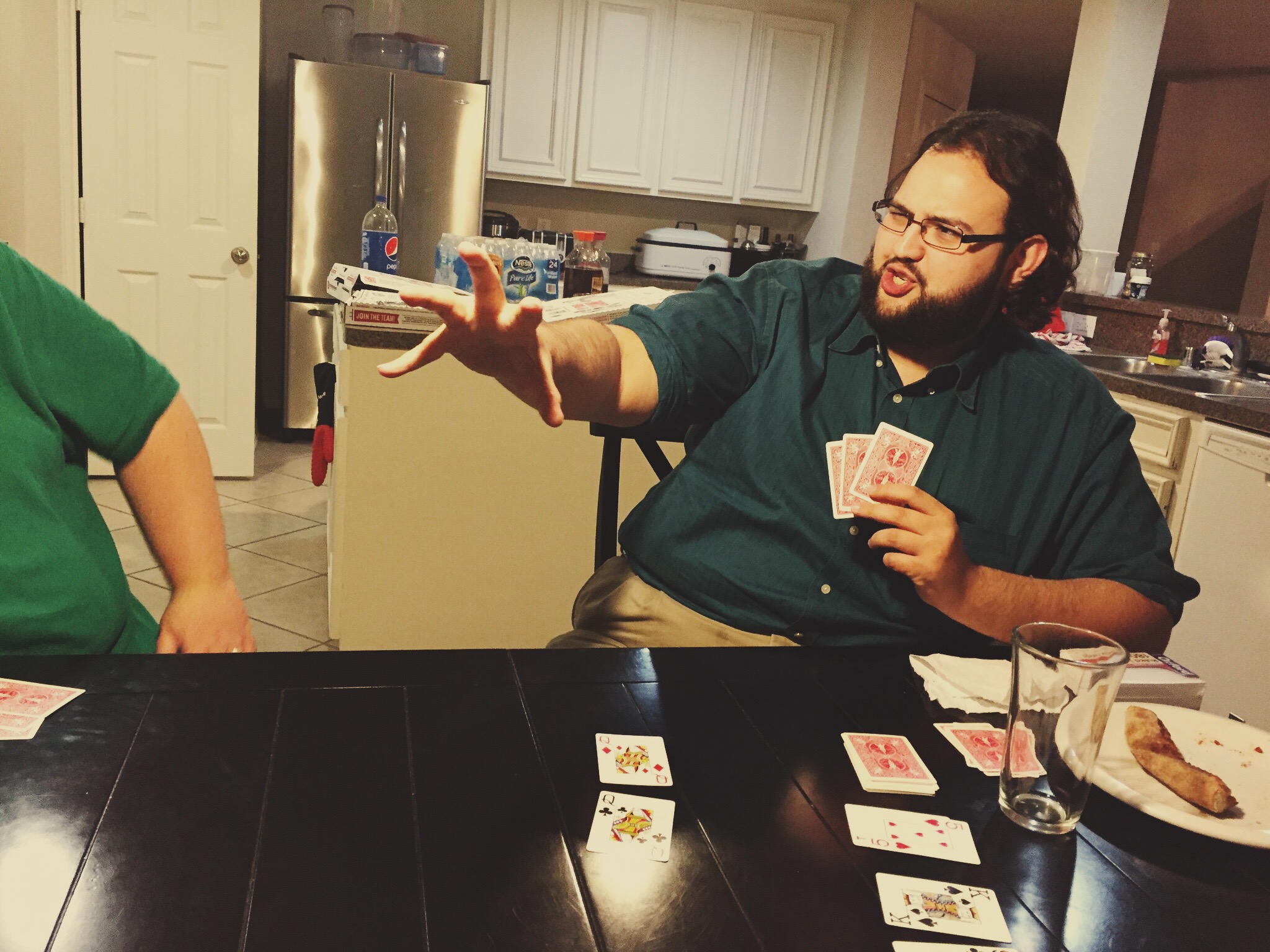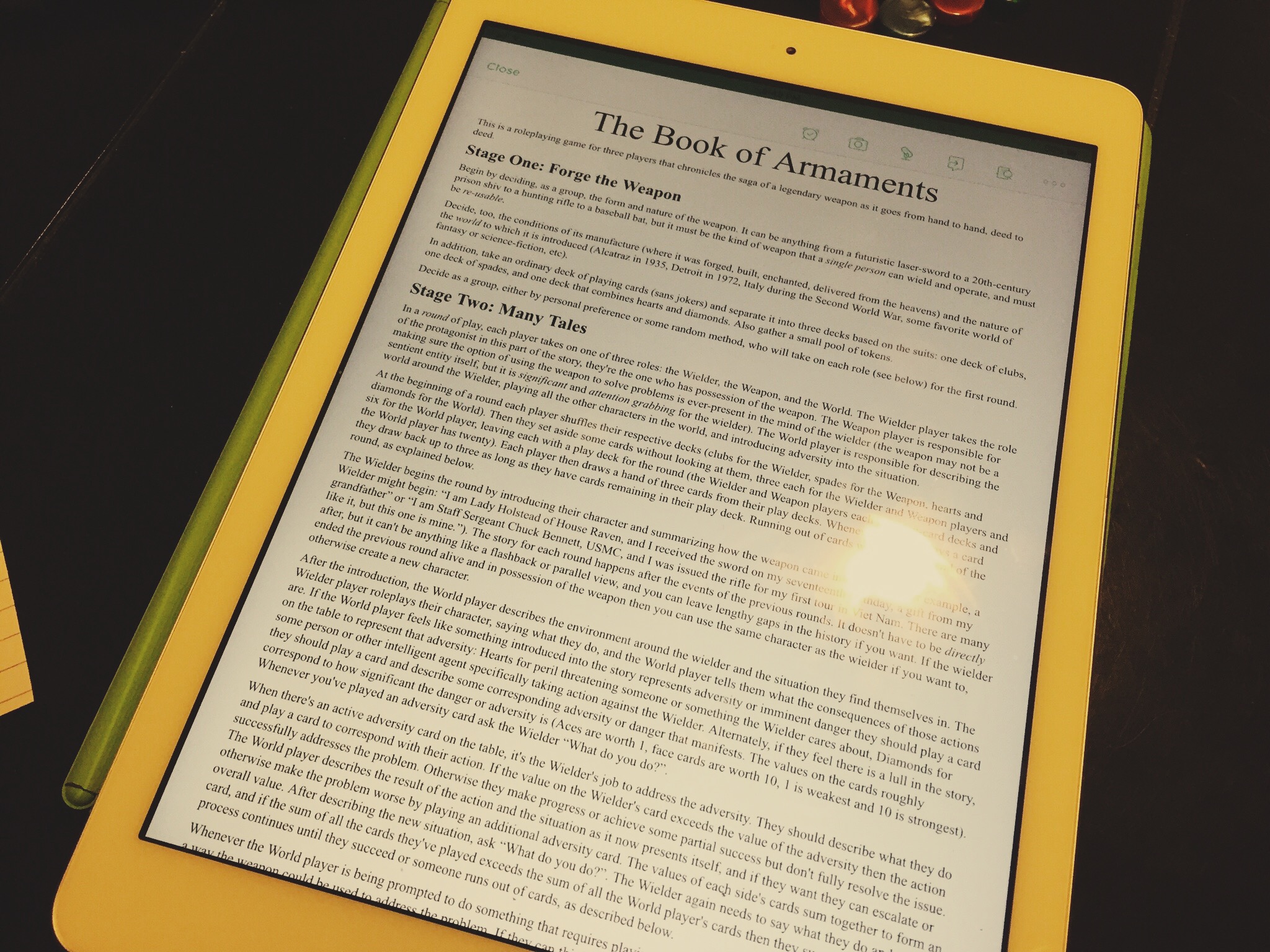On Friday, we played four more games from the #threeforged contest. My table did The Book of Armaments and my own Stage 2 game (only because we finished The Book of Armaments early and I wasn’t ready to run anything else). I’m not going to talk about my own game, but below are my thoughts on the other. Steve Mains will likely do a separate post for the games he ran.
The Book of Armaments
I liked it. The game is focused on a weapon, forged in a certain era, and its details are settled on before play. We chose to do a fantasy thing, but you can also do weapons for modern or historical settings. It’s a strictly three-player affair (despite the game’s advice on how to make it work for more than three), played out over several rounds. On a given turn, one player is the Wielder, one player is the Weapon, and one player is the World. The Wielder describes himself and how he came in possession of the weapon. The Weapon player’s job is to constantly advocate for when the weapon might be of use in a conflict. The Word player is basically the GM, and frames scenes for the Wielder. Each player has a deck of cards, and the idea is you use these cards to set the difficulty of challenges (World) or to overcome challenges (Wielder and Weapon). The Wielder’s cards are for when he uses means other than the weapon to get past the challenge. The Weapon cards are used if the Wielder accepts the Weapon player’s advice and uses the weapon to overcome it. The round ends when one of the players is out of cards, and whoever that was determines if the overall story arc for the Wielder was successful, and if the weapon passes to another character in history. The player roles shift and you begin anew, possibly with a new Wielder character. Rinse and repeat until you feel satisfied. There is also a competitive thing you do between rounds, which I will discuss below.
The game is fast-paced and fun. There are a couple of things in the rules that don’t quite work as intended, but they would be very easy fixes (and if the authors of the game are reading this, they should definitely get in touch for details). Our particular game got a little gonzo halfway through, but I think that’s because we went with a magic weapon, which allowed the Weapon players to get a little crazy with our armament’s capabilities. I think a game in a historical or modern setting would avoid that tendency, and I’d love to try it again in one of those modes. Overall, though, I was happy with the pace of the game and the ease with which we were able to tell these stories. I also liked how the stories changed between rounds, particularly when the sword passed to a new Wielder. It felt a little like In a Wicked Age in the way you get to see different slices of history focused around a core character (or, in this case, a weapon). In fact, I think the rules should be changed so that the Wielder character is always different between rounds. I’m not sure it would be as interesting to do two consecutive rounds with the same Wielder character.
The one big issue I had with the game is this inter-round competitive procedure in which each player makes a judgment about whether they think the round’s story saw the weapon having a greater impact on one of the following three things: the deeds done with the weapon, the soul of the Wielder, or the souls of those affected by the weapon. Each player has a different combination of two from which they can choose (which is an incredibly weird design decision; why can’t each player just choose from all three?). You make your choice and put a card representing it facedown in front of you. You reveal the cards and, depending on the combination of cards revealed, one of the three players gets a token. Whoever has the most tokens at the end of the game gets to decide the final fate of the weapon.
I understand this procedure is supposed to allow the players to reflect on the consequences of various choices made in the story, but I can’t overstate how flat this part of the game is. It added nothing to the proceedings, particularly because the distinctions between the three choices are so fuzzy. I think there is a more interesting way to get to the outcome the designers were aiming for. But, truly, you could remove this part entirely and the game wouldn’t be missing a thing. You’d just have to come up with an alternate method of deciding the weapon’s final fate.
All in all, though, I liked this one a lot. It’s definitely one of my favorites from the contest.




Hey Jason Cordova , I was the stage 3 designer on The Book of Armaments. I’m interested in hearing about the minor points you mentioned (via whatever method is convenient for you, G+, e-mail, etc.).
As to why you can’t pick from among all three choices at the close of each round, then one of the choices would result in giving a token to yourself, and I thought the slightly-competitive nature of this subsystem would create a nagging doubt that you’d be dumb not to do the thing that would guarantee you a point (which would also turn into a perpetual stalemate if everyone did it), I figured it would be easier to engage in honest reflection and judgment if self-voting wasn’t even an option.
Thanks for playing and for the feedback.
Hey Jason Cordova , I was the stage 3 designer on The Book of Armaments. I’m interested in hearing about the minor points you mentioned (via whatever method is convenient for you, G+, e-mail, etc.).
As to why you can’t pick from among all three choices at the close of each round, then one of the choices would result in giving a token to yourself, and I thought the slightly-competitive nature of this subsystem would create a nagging doubt that you’d be dumb not to do the thing that would guarantee you a point (which would also turn into a perpetual stalemate if everyone did it), I figured it would be easier to engage in honest reflection and judgment if self-voting wasn’t even an option.
Thanks for playing and for the feedback.
Dan Maruschak As it turns out, one of your fellow co-designers, David LaFreniere, is a good friend of mine, and I shared my thoughts with him. I’ll give you the capsule version here, but you guys should definitely confer on the final re-write, because you have a real winner in this game. It was a lot of fun.
The most obvious mechanical issue I noticed was that it seems mathematically near-impossible for the Wielder and the Weapon to ever defeat the World (and, in fact, in our three rounds, the World players went undefeated). As I understand the rules, the World player can narrate complications/escalations without laying down a new card. That means he just has to get far enough ahead to force the other two players to beat him. And since they have to beat him (instead of simply tying him), they are almost always going to have to play net more cards than him on any given conflict.
Also, the end-round trigger sometimes led to a situation where the Weapon had no more cards, but the Wielder did. According to the rules, you play until someone has to play a card and they can’t. In the above case, the Wielder can keep playing and simply not accept the suggestions of the card-less Weapon. Does that mean the round simply continues, even though the Weapon player has no cards? It would probably be better to simply end the round as soon as someone is out of cards.
As for the inter-round procedure, I think the reason why it felt a little flat to us was because the core idea (reflecting on how the weapon affects those who encounter it) was really cool, but the procedure seemed a little arbitrary and/or same-y as far as the choices went. I think there is a way to get to that same outcome, but in a more satisfying way.
I hope that’s helpful.
Dan Maruschak As it turns out, one of your fellow co-designers, David LaFreniere, is a good friend of mine, and I shared my thoughts with him. I’ll give you the capsule version here, but you guys should definitely confer on the final re-write, because you have a real winner in this game. It was a lot of fun.
The most obvious mechanical issue I noticed was that it seems mathematically near-impossible for the Wielder and the Weapon to ever defeat the World (and, in fact, in our three rounds, the World players went undefeated). As I understand the rules, the World player can narrate complications/escalations without laying down a new card. That means he just has to get far enough ahead to force the other two players to beat him. And since they have to beat him (instead of simply tying him), they are almost always going to have to play net more cards than him on any given conflict.
Also, the end-round trigger sometimes led to a situation where the Weapon had no more cards, but the Wielder did. According to the rules, you play until someone has to play a card and they can’t. In the above case, the Wielder can keep playing and simply not accept the suggestions of the card-less Weapon. Does that mean the round simply continues, even though the Weapon player has no cards? It would probably be better to simply end the round as soon as someone is out of cards.
As for the inter-round procedure, I think the reason why it felt a little flat to us was because the core idea (reflecting on how the weapon affects those who encounter it) was really cool, but the procedure seemed a little arbitrary and/or same-y as far as the choices went. I think there is a way to get to that same outcome, but in a more satisfying way.
I hope that’s helpful.
Dan Maruschak I would love to work further on this with you. I was blown away by the final product, and wanted to thank you for sticking with my initial premise. Many games were not fortunate enough to make it to the end. Less still stuck to the original premise. I was excited to see my idea had been through both hurdles successfully, and I have you to thank.
Dan Maruschak I would love to work further on this with you. I was blown away by the final product, and wanted to thank you for sticking with my initial premise. Many games were not fortunate enough to make it to the end. Less still stuck to the original premise. I was excited to see my idea had been through both hurdles successfully, and I have you to thank.
David LaFreniere Cool, I’d like to try to work together to take it further. (Although the premise almost didn’t survive! I’m going to do a writeup of my stage 3 process, hopefully later today, where I talk about that).
David LaFreniere Cool, I’d like to try to work together to take it further. (Although the premise almost didn’t survive! I’m going to do a writeup of my stage 3 process, hopefully later today, where I talk about that).
I was just reading the stage 2 work. Wow each stage was vastly different
I was just reading the stage 2 work. Wow each stage was vastly different
I posted my writeup of my stage 3 perspective on designing the game here: https://plus.google.com/u/0/+DanMaruschak/posts/BfTyPZ1KdkN
I posted my writeup of my stage 3 perspective on designing the game here: https://plus.google.com/u/0/+DanMaruschak/posts/BfTyPZ1KdkN